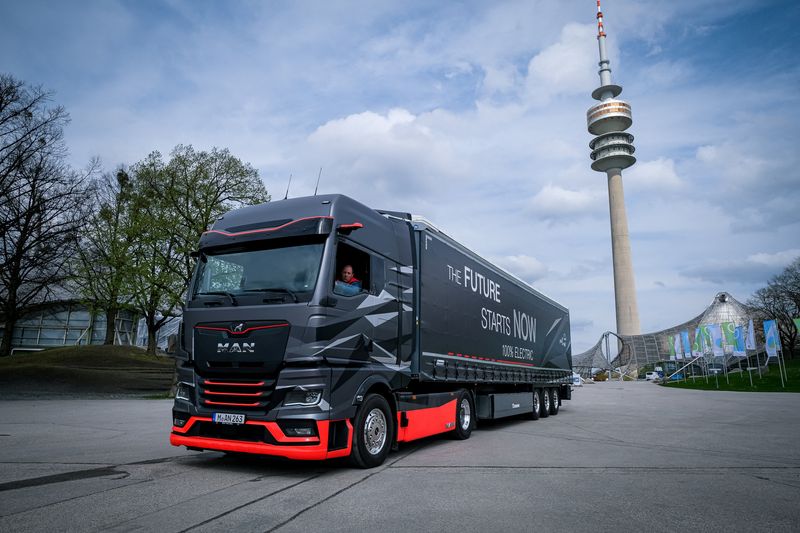Big truckmakers bet on hydrogen to extend combustion engine life
2024.08.01 01:12
By Christina Amann and Nick Carey
BERLIN/LONDON (Reuters) – Some of the world’s biggest truckmakers, including Volvo and MAN, are reworking combustion engines to run on low-emission hydrogen instead of polluting diesel, a quicker low-cost fix to their energy transition challenge that may give the dying technology a fresh lease of life.
The global truck making industry faces a complex balancing act to get to zero emissions. Electric batteries are too heavy for long-haul freight operations and take long to charge. Using hydrogen fuel cells to generate electricity reduces the weight and extends the range of trucks, but switching to this technology is expensive as companies need to design new truck systems.
That is why truckmakers and their suppliers have shifted their immediate focus on developing hydrogen combustion engines as a quicker, cheaper solution that can rely on existing manufacturing lines that have for years been a key economic motor for countries like Germany, executives at major truck brands and their suppliers told Reuters.
Concerns over what will happen to thousands of jobs in engine-making plants have grown as truckmakers shift towards battery and fuel cell options.
“Everybody is working on this,” said Reiner Roessner, vice president for sales at the engine division of MAN Truck & Bus SE, part of Volkswagen (ETR:) trucking unit Traton, even as green hydrogen produced by renewable sources is not yet widely available. “As soon as the hydrogen is available, demand for hydrogen combustion will go up.”
In its first pilot project, MAN will deliver around 200 trucks with engines that run on hydrogen to European customers next year to test in their fleets, a key step on the way towards mass production.
Truckmakers are still investing in developing hydrogen fuel cells as they say there is room for both technologies to exist side by side for different vehicle types and uses.
Swedish truckmaker Volvo AB (OTC:), which says it will also have hydrogen fuel cell trucks “commercially available in the second half of this decade,” is planning customer tests of hydrogen combustion engine models starting in 2026.
Hydrogen combustion engines “will not be the majority” of Volvo’s sales, said chief technology officer Lars Stenqvist. “But it will be a substantial volume.”
Anders Johansson, vice president for heavy-duty vehicles at Vancouver-based Westport Fuel Systems (NASDAQ:), said his company has already provided fuelling systems for 6,000 combustion engine trucks in Europe that run on or biogas and can easily be adapted to hydrogen.
CHALLENGES AHEAD
Even though the technology is relatively mature, there are challenges to overcome.
Unlike fuel cells, burning hydrogen in an engine can produce some harmful emissions that Michael Krueger, senior vice president for engineering at major supplier Bosch, said will require a filter.
Westport’s engine system currently uses 1% diesel to ignite hydrogen, which Johansson said will be reduced and eventually replaced with a carbon-free fuel.
Also, hydrogen trucks need pressurized tanks that are larger than the ones used for diesel, so firms like Munich-based startup Keyou are working on different shapes to shrink them down. And the tanks need to be safe under all conditions as hydrogen is a highly flammable gas.
By far the largest problem for hydrogen combustion engines and fuel cells alike is the scant availability of green hydrogen.
The European Union and the United States are funding green hydrogen projects alongside truck makers like Daimler (OTC:) and energy giants like BP (NYSE:). But the rollout has been slow, and it will take years to build up sufficient fueling infrastructure.
Despite the challenges, major suppliers like Bosch and Cummins (NYSE:) say truck makers have embraced the hydrogen combustion engine because they already have factories and supply chains dedicated to the technology.
“We want to be fast. That’s why this technology has a role to play,” Bosch’s Krueger said.
Truckmakers from Italy’s Iveco Group and DAF, a European unit of U.S. truckmaker PACCAR (NASDAQ:), are also working on hydrogen combustion options.
Just last week Germany’s Daimler unveiled two prototype hydrogen combustion engine vehicles.
U.S.-based Cummins will provide test models to customers in different regions in the next year or two and should have a market-ready product within five years, said chief technical officer Jonathan Wood.
Rather than leave truck fleets waiting for green hydrogen to become widely available, some truckmakers and suppliers say combustion engines running on natural gas or biogas can provide an interim, lower-emission solution than diesel.
Cummins’ Wood said making a hydrogen combustion engine involves changing some key components in its natural gas models, which will allow customers to work their “way down the carbon emissions curve”, from diesel to natural gas then hydrogen.

As well as being an easier switch for manufacturers, trucks running on combustion engines will be easier for fleet customers to handle in the medium term than fuel cell models because it’s a technology they are familiar with, Wood said.
“This is a game changer without a change,” said Westport’s Johansson.
(Christina Amann reported from Berlin and Nick Carey from London; additional reporting by Sarah McFarlane in London and Giulio Piovaccari in Milan; Writing by Nick Carey; Editing by Lisa Jucca)








